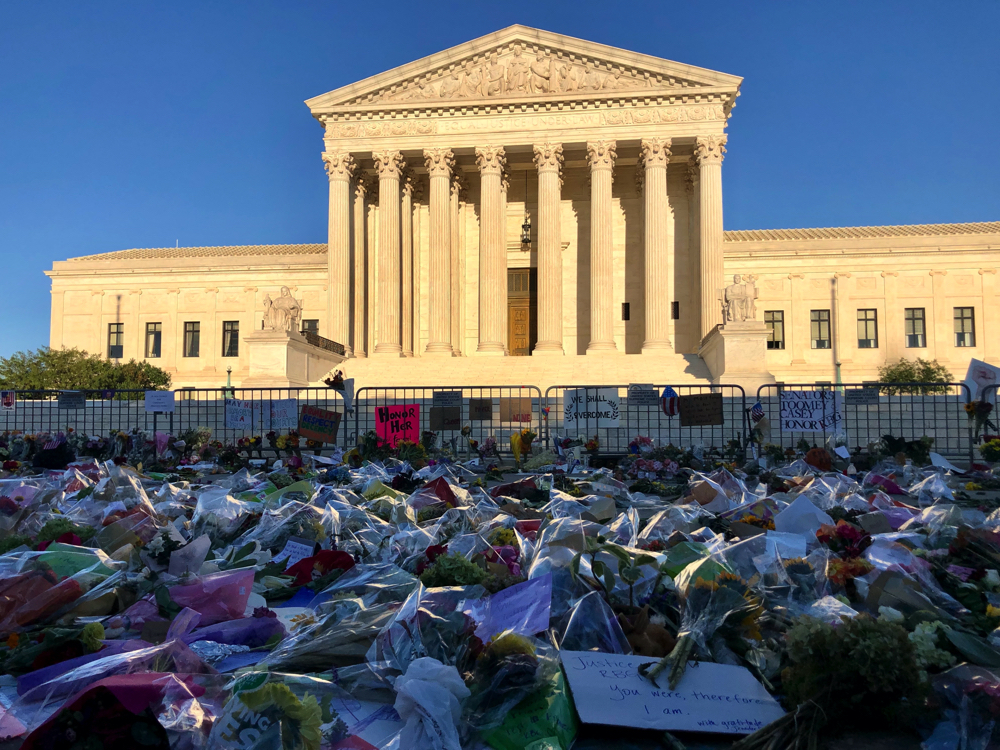03 Nov New Supreme Court Term: And Then There Were Eight

Margaret A.M. Heine
is the principal counsel at Heine Law Group in Fullerton, California. She is licensed in California and Washington and has authority to practice before the Supreme Court of the United States and the United States Court of International Trade.
Her practice includes estate planning, wills, trusts, and probate as well as business, real estate, and civil litigation. Email: nbylegas@gmail.com or visit company website www.margaretamheine.com.
New Supreme Court Term: And Then There Were Eight
The new Supreme Court for October 2020-October 2021 began on October 5th. Once again the Court finds itself with only eight seated justices. Due to the COVID pandemic, the court is starting out this term hearing cases by teleconference/video link. The proceedings are broadcast so that they can be heard and observed, as though the argument took place in open court. The Court will hear the cases set for argument in November and December via the same means. The Court will be taking up twelve cases from its last term which had argument canceled because of COVID. In total, the Court will hear and determine twelve cases from last term and seventy four cases from this term.

In October 2020, the Court heard ten cases with only eight justices on the bench. A very interesting constitutional question is raised in Carney v. Adams as to whether a state can restrict the number of justices in its courts to a bare majority from one political party, leaving the other seats open to other justices of other political parties. The argument centers on whether the First Amendment to the Constitution permits this segregation on the court while the First Amendment indicates that appointment to public office is without regard to a person’s political affiliation. As a straight constitutional question, it will be interesting to see the decision made by Court this term.
City of Chicago, Illinois v. Fulton is an interesting bankruptcy case. Fulton had her car impounded and filed bankruptcy. Under the bankruptcy court the amount of money Fulton owed the city was included as part of a repayment plan which the Court approved. The City of Chicago refused to return the car to Fulton under the court rulings, and appealed the orders to return the car. Upon failure of the City to restore the car to Fulton, the court issued $100/day fines against the City until the car was restored to Fulton. Ultimately, the car was restored to Fulton, but the ruling is disputed as to whether or not the filing of a bankruptcy petition requires the return of the holding of collateral pending payment of a debt. This could affect the application of bankruptcy law across the country and modify the rights of debtors and creditors.
Another interesting ruling from the October session was the review of Alabama’s restriction on curbside voting. Alabama had determined that curbside voting was not permitted in the State. The issue was marched up the court ranks, which allowed that curbside voting should be permissible. The Secretary of State argued, among other things, that the ban was essential in order to maintain the integrity of the voting process in the state. Upon review by the Supreme Court, the Court ruled that a restriction on curbside voting was constitutional, and that the ban could be reinstated and enforced. The dissent concluded that the pandemic should be considered and curbside voting allowed for the health and safety of the citizens.
There will be a series of cases heard about Fourth Amendment issues on search and seizure laws, Immigration policies including the building of the wall with funds allocated by Congress and from other governmental budgets, on the legality of having asylum seekers await trial but remain in Mexico until their cases can be heard, and abortion clinic requirements in Louisiana.
The vacancy created by Justice Ginsburg’s death, should it be filled by Judge Barrett, may have no significant impact on the decisions made by the court during this term. Judge Barrett’s decisions could surprise her detractors, as no one can really predict how she will vote.
Barrett’s decisions have been cautious. She has recommended that the full appeals court hear issues relating to abortion and gun rights, that is not overreaching or being against those rights, she simply believed that more of the bench should hear the arguments and make a full decision.
Barrett did support that men should have an avenue to defend themselves against allegations of rape and sexual assault, and that words alone should not support damages, but that real damage needed to be found.
Barrett also applied the law in immigration rights cases. She applied the laws that were passed during the Clinton administration, and refused to reinterpret that law to provide different benefits to non-statused immigrants.
Thus far, her opinions have not strayed from her stated belief that she would enforce the laws as written, not rewrite the laws according to modern whims. She expects legislature to continue to draft and pass the laws. It appears that this will be true of Roe v. Wade. It does not appear that Judge Barrett will vote to overturn the law, but she will carefully view what rights Roe v. Wade affords women with regard to reproductive issues. As every case on the Supreme Court is led by the full bench, and all justices may join in an opinion or a dissent, the real nature of her application of law will be realized. Until then, there is simply speculation.
The 2021 Supreme Court term should be a fascinating look at the court’s direction for the near term.




Sorry, the comment form is closed at this time.